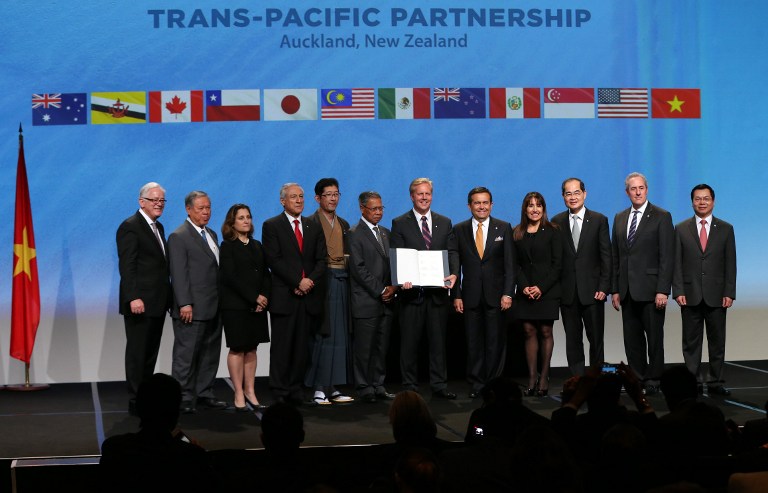 New Zealand Prime Minister John Key (centre) and ministerial representatives from 12 countries pose for a photo after signing the Trans-Pacific Partnership agreement in Auckland today. – AFP pic, February 4, 2016. Twelve countries including Malaysia have finally signed the Trans-Pacific Partnership in Auckland today which is set to expand markets, reduce tariffs and promote freer trade.
New Zealand Prime Minister John Key (centre) and ministerial representatives from 12 countries pose for a photo after signing the Trans-Pacific Partnership agreement in Auckland today. – AFP pic, February 4, 2016. Twelve countries including Malaysia have finally signed the Trans-Pacific Partnership in Auckland today which is set to expand markets, reduce tariffs and promote freer trade.
International Trade and Industry Minister Datuk Seri Mustapa Mohamed signed the pact for Malaysia that represents nearly 40% of global gross domestic product worth US$30 trillion (RM124 trillion).
The signing of TPP in New Zealand's capital city is the culmination of five years and 19 rounds of tough negotiations.
The 12 countries are New Zealand, Australia, Chile, Mexico, Japan, Peru, Canada, Vietnam, United States, Singapore, Brunei and Malaysia.
Most of these countries comprise Malaysia's major trading partners.
TPP is aimed at promoting economic integration to liberalise trade and investment as well as spur economic growth and social benefits.
More than 90% of the economic gains will be attributable to lower non-tariff measures.
It is also expected to create new opportunities for workers and businesses, contribute to raising living standards of 800 million people, benefit consumers, reduce poverty and promote sustainable growth.
Besides Mustapa, Datuk J. Jayasiri was also present at the signing.
The signing ceremony, held at Skycity Convention Centre in downtown Auckland, began at 9.00am local time with a cultural performance followed by ministerial meeting before the signing.
Malaysia, which joined TPP in the third round of negotiations in October 2010, will see its GDP increase by US$107 billion to US$211 billion between 2018 and 2027.
Investments are projected to increase by US$136 billion to US$239 billion between 2018 and 2027, largely due to higher investment growth in textiles, construction and distributive trade. – Bernama, February 4, 2016.

Comments
Please refrain from nicknames or comments of a racist, sexist, personal, vulgar or derogatory nature, or you may risk being blocked from commenting in our website. We encourage commenters to use their real names as their username. As comments are moderated, they may not appear immediately or even on the same day you posted them. We also reserve the right to delete off-topic comments